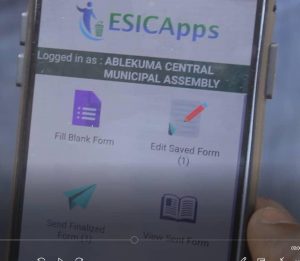
ESICApps is a new mobile app developed by the Ministry of Sanitation and Water Resources. Kofi Ahovi takes a look at how it is helping to gather data for development and making the work of the Environmental Health Officers easy.
Without data, you are blind and deaf in the middle of a freeway.” – Geoffrey Moore, management consultant and theorist.
Environmental sanitation management, despite being universally recognized as a critical development issue, remains a challenge in developing countries. While about 99% of people living in industrialized countries have access to improved sanitation, only about 53% of the population in developing countries have such access.
In Ghana, according to the World Health Organization, less than a quarter of the population have access to improved sanitation and the major challenges as stated by both the National Development Planning Commission (NDPC) and the Ghana Statistical Service (GSS) are inadequate financing of sanitation infrastructure, education and poor enforcement of regulations.
To address these challenges, the government of Ghana introduced the sanitation inspection unit popularly known as the ‘Samasama’ to help instil discipline in the populace by adhering to proper sanitation management but for lack of resources (both human and capital) and the dynamic and exponential growth of the municipal, metropolitan and the district assemblies, the programme faced implementation challenges.
This gave birth to the Expanded Sanitary Inspection Compliance and Enforcement (ESICOME) in 1999. The ESICOME is an intervention which was designed and implemented to improve premises inspection to respond to the emerging poor sanitation and to accelerate the much-needed socio economic development.


The ESICOME was specifically targeted at mobilizing owners and occupants of premises be it residential, commercial and institutions to develop and maintain good sanitation on their properties and their environs. The ESICOME is for the conduct of Premises inspection as a framework for delivery of the other components.
The visits to premises provided the unique opportunity, for effective person to person communication for environmental hygiene education, provision of sanitary information and upgrading of the public’s knowledge of sanitary legislations.
The main objective of the ESICOME programme is to improve upon general sanitation in the communities with the view to promoting the health of present and future generation.
Specific Objectives are to:
Conduct regular sanitary inspection of premises and their environs
Provide, proper utilization and maintenance of sanitary amenities of premises by their owners/occupants.
Enforce existing sanitary regulations
Embark on hygiene education and sensitization
The ESICOME achieve some benefits in good environmental sanitation in premises and the community, higher sanitary discipline in public behaviour, effective discharge of the statutory responsibilities of the assemblies. However, there were some administrative challenges and all also meeting global digital application for effective service delivery the ESICOME document were updated and developed into mobile application software hence ESICapps (Expanded Sanitary Inspection, Compliance and Enforcement Mobile Application)
Read also: GAMA Project exceeds target in toilet provision for households
ESICApps is a tool for Environmental Health Officers working in the Environmental Health and Sanitation Unit of the various Metropolitan, Municipal and District Assemblies mobile based data collection tool developed by the Ministry of Sanitation and Water Resources to gather data on water and sanitation management across the country for the purposes of planning and addressing identified challenges.
There are eight forms on the mobile application
1. Premises Inspections
2. Institutional Premises
3. Hospitality Homes
4. Health Care facilities
5. Sanitary Facilities
6. Industrial Premises
7. Eating and Drinking Premises
8. Markets and Lorry parks

The idea was to equip sanitation inspectors with ICT tools to aid in evidence-based inspection reporting. This platform was developed with support from the World Bank under the GAMA project. The current scope of the data on the platform is baseline data collection done for residential, hospitality, educational institutions, markets, lorry parks for all MMDAs in the Greater Accra Region.
The baseline data collection which started in 2018 is expected to end in December 2021. So far, about 40% of data has been collected from within the Greater Accra region. However, the National Coordinator of the project, Charlotte Adjei Marfo, believes that her team will be able to finish collecting the baseline data from Greater Accra Region and Ashanti Region before the deadline.
Marfo noted that, data collection was very key in addressing the sanitation challenges of the country.
“Data really powers everything that we do on earth, so to enable us plan, implement and monitor the ESICOME Programme, we developed ESICApps to facilitate data collection,” she stated.

The ESICOME has four major components. These are Premises Inspection, Environmental Hygiene Education and Sensitization, Dissemination of Sanitary Information and Enforcement of Sanitary Regulation. An inspection team that visits premises will perform all the four components in the course of the visit.
The implementing team is expected to conduct regular sanitary inspection of premises and their environs, provide proper utilization and maintenance of sanitary amenities of premises by their owners/occupants, enforce existing sanitary regulations and embark on hygiene education and sensitization.
These activities are expected to result in good environmental sanitation in premises and the community, higher sanitary discipline in public behaviour and an effective discharge of the statutory responsibilities of the Assemblies.
How ESICApp works: Experience of Ablekuma Central Municipal Assemblies
Prince Nyavi, ESICAPP facilitator and Environmental Health Inspector with the Ablekuma Central Municipal Assembly, is of the view that, the ESICApp is very easy to work with once an individual is computer literate, understands how to select the kind of premises to inspect and knows the questions to ask the respondents.
Here in Ablekuma Central the dominant premises we inspect are chop Bars as well as small and table top eateries,” he noted.
Read also: President Praises Sanitation Minister, Zoomlion CEO
He observed that previously, the sanitation inspectors faced lots of challenges, adding that some property owners were very hostile to them but with ESICApp, things have changed since the approach has also changed.
Formerly, as inspectors, it wasn’t easy for us. It was always confrontational with respondents and owners of premises since they had it in mind that we were only present to arrest them. Due to that most of them were reluctant to give us information. But now the relationship is friendly and we make them understand that we are there to collect the data to help them. When we see something wrong, we alert them and give them time to correct it,” he stated.
Also, “It helps us the inspectors to monitor the work we do since our work is documented. At times we go to field and there is no prove to show. However, with ESICAPP anytime you go to the field it is documented. If not, it also shows since the number of times an officer goes to the field is recorded in the App. We were all told to inspect at least 8 to 10 premises a day, and the data shows whether or not you are working according to that target”, he noted.
In Ablekuma Central, the team has collected data from over 5,000 premises which include industrial premises such as Abossey Okai and a few residential premises. The data shows that some areas are lagging behind while others are improving. For instance, in Saabun Zongo, sanitation is around 30% as they do not have good drainage systems and proper waste collection. This shows that Saabun Zongo is not doing so well when it comes to sanitation, as such interventions have to be put in place. However, in Latebiokorshie, sanitation is around 80%. The only challenge there is intermittent water supply which is being worked on.
ESICAPP has given us baseline information which we will use to provide water for areas without water supply in 2021,” he hinted. These areas include Shukura and Town Council Line.
According to Reuben Hacker, a tenant and a respondent, the data collection process is not too tedious but rather time consuming. “It took about 30 minutes or more because the questions were detailed. I thought it will have simple questions like “do you have this, or do you have that” but that wasn’t the case. They asked how many people were in the house, the number of males and females and all of that, which to me was time consuming,” he lamented.

A landlord within Laterbiokorahie in the Ablekuma Central Municipal Assembly, Prince Amarh Commey, observed that the team has constantly been collecting data from his house and this has enhanced sanitation in the house. “We didn’t have toilets and water in the house until their regular visits. They advised us to connect water and build toilets. Now, most of the rooms have toilets and we also have two toilets outside for those that do not have them in their rooms,” he said.
Read also: Addressing sanitation issues with ESICApps
Success stories
The implementation of the ESICOME Programme has achieved some success. For instance, after the baseline data collection in Ablekuma in the Ga East metropolis, it came to light that there are communities without access to portable water. The Ministry of Sanitation and Water Resources therefore prompted the Ghana Water company of the situation and other NGOs like Rotary Club who wanted to help.
Again, the MSWR is able to map out certain hotspots with poor water management and storage system and provide the needed interventions. For example, in the advent of cholera outbreak, the ministry can quickly move to these hotspots and safeguard lives.
Challenges
Prince Nyavi, however, acknowledged that there are few challenges. “At times it is difficult to open and launch the app on the phone as it freezes. When you open the ESICApp, it closes by itself. And, also after collection of data and finalizing the form it becomes difficult to send when the internet is not strong”. These challenges are, however, very minimal considering the benefits derived from ESICApp.
Charlotte Adjei Marfo also shared the same sentiments but added that most of her team members have learnt some basics of coding to enable them address little challenges that may arise from using the app. “Where the challenge is complex, we fall on the developers,” she hinted.

Conclusion
It is obvious that the ESICApp has come to stay and if for anything at all, it would be improved to work offline to enable the inspection team to collect data even when the data is down. And when the baseline data collection is done, the MSWR will be in a strong position to appropriate tailored solutions to specific challenges faced by the MMDAs. It will then move from the blanket solution it has been providing in solving sanitation challenges which of course has not really worked.


[…] Read also: Addressing sanitation issues with ESICApps […]
[…] Read also: Addressing sanitation issues with ESICApps […]
[…] Read also: Addressing sanitation issues with ESICApps […]